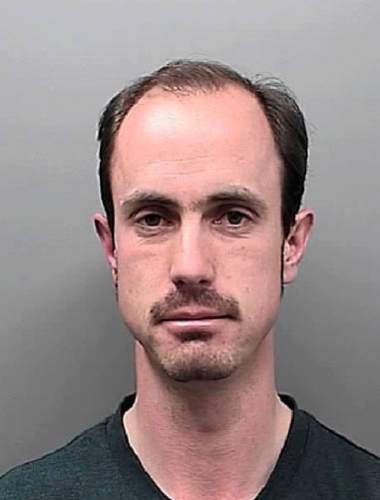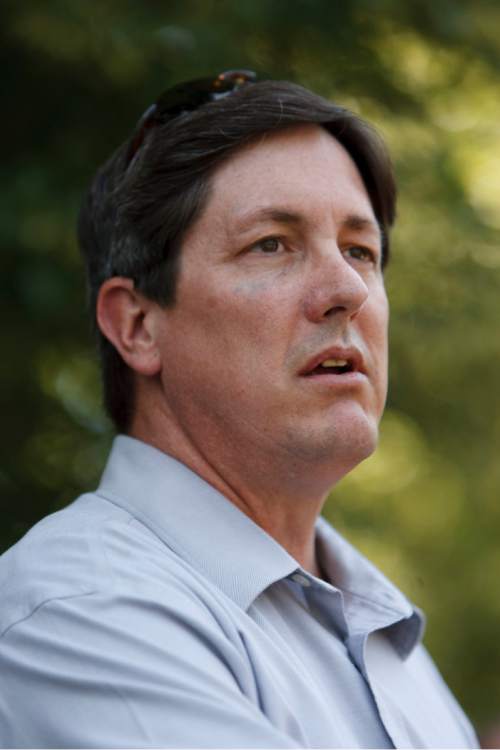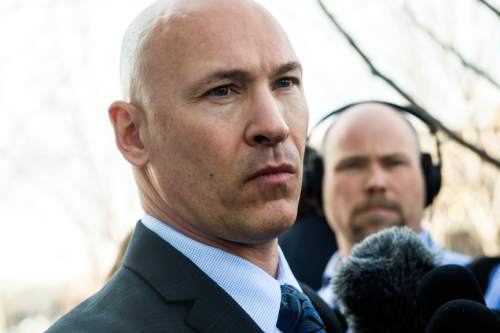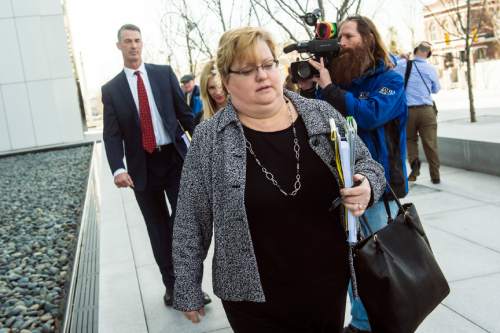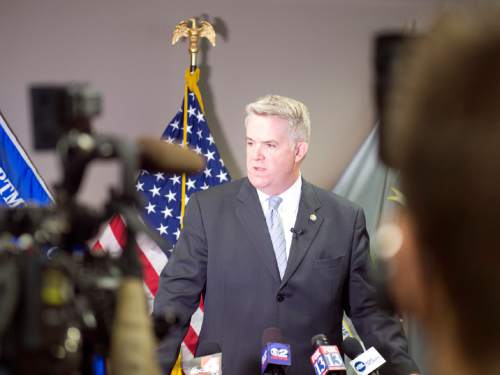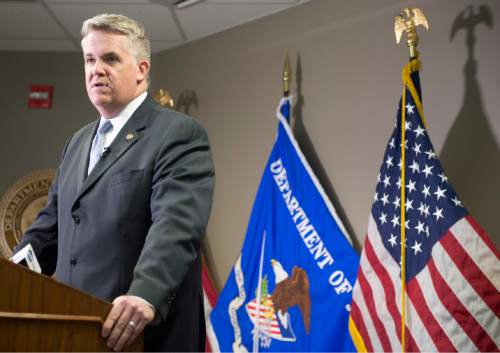This is an archived article that was published on sltrib.com in 2016, and information in the article may be outdated. It is provided only for personal research purposes and may not be reprinted.
Thomas Jeffs had mixed emotions Wednesday as he saw his father, Lyle Jeffs, and another leader of the polygamous Fundamentalist Church of Jesus Christ of Latter-Day Saints shuffle into a federal courtroom shackled and chained to answer to charges of food stamp fraud and money laundering.
He said it was painful to see his father in handcuffs, dressed in a white-and-blue-striped jumpsuit with the words "Jail Inmate" inked on the back. But he added that he thinks the arrests of his father and 10 other FLDS church leaders and members could bring needed change to Hildale, Utah, and Colorado City, AZ, — collectively known as Short Creek — an area the religious group calls home.
"I feel like it's a necessary thing to happen for the people down there to actually have a taste of freedom," Thomas Jeffs said. "But it will still be awhile [before] they'll actually feel that."
Six of the 11 people charged Tuesday with conspiring to defraud the Supplemental Nutrition Assistance Program (SNAP) and conspiracy to commit money laundering made their first court appearances on Wednesday. In Salt Lake City, Lyle Jeffs and fellow FLDS leader John Clifton Wayman were in court; both pleaded not guilty to the two-count indictment.
Wayman was represented in court by private attorney James Bradshaw, while Lyle Jeffs was found indigent and was appointed public defender Kathryn Nester.
LeRoy "Roy" Jeffs, the son of Warren Jeffs, the imprisoned prophet of the FLDS church, also watched Wednesday's court proceedings and said afterward that he felt happy — like a weight of despair, a feeling that bad things could happen to his younger siblings still in Short Creek, had been lifted.
"I had a big smile on my face," LeRoy Jeffs told news reporters. "It feels like they might get somewhere with this. Obviously, it's going to hurt the people, because these guys dictate everything down to what they wear and what they eat and how much they eat. So it's definitely going to hurt the people but, ultimately, good is going to come of it."
Prosecutors want the defendants to remain behind bars pending trial on the federal charges. A detention hearing was set for Friday for Wayman, while Lyle Jeffs' detention hearing will be on March 7. Meanwhile, both men will remain in custody at the Davis County jail.
A motion filed by prosecutors seeking to detain Lyle Jeffs, Wayman, Seth Jeffs — brother to Lyle and Warren Jeffs — and Nephi Allred cites an "elaborate" system for moving and hiding members of the group to avoid detection by law enforcement, which includes apartments and houses in the U.S., western Canada, Mexico and South America. The system was originally developed to protect Warren Jeffs from prosecution, according to the motion.
The motion also requests "strict conditions" for the other indicted members' release.
"If they got bail, they'll definitely run," said LeRoy Jeffs, who left the FLDS community two years ago. "That's a given. They'll run just like my dad ran. Everything's a big secret."
Those indicted along with Lyle Jeffs, 56, Wayman, 56, Seth Jeffs, 42, and Nephi Allred, 40, were Kimball Dee Barlow, 51, Winford Johnson Barlow, 50, Rulon Mormon Barlow, 45, Ruth Peine Barlow, 41, Preston Yates Barlow, 41, Hyrum Bygnal Dutson, 55, and Kristal Meldrum Dutson, 55.
Winford Barlow, Kristal Duston and Ruth Barlow all pleaded not guilty Wednesday in a St. George courtroom. A hearing for Seth Jeffs in South Dakota was delayed until Monday, according to federal prosecutors.
The potential penalty for the conspiracy count is five years in prison. The money laundering count carries a potential penalty of 20 years in prison.
Prosecutors say church leaders ordered members to give their SNAP benefits — in food and cash transfers — to the church, which collects and redistributes commodities to the community. The leaders tell church members that they must obtain their food and household goods only through the church, the indictment alleges.
"I think [the charges] are legitimate," said Thomas Jeffs. "When I was even in the church, I asked [Lyle Jeffs] why they were doing that. And he says, 'We'll be fine, and we're 10 steps ahead of the government and there's nothing to fear.' "
Thomas Jeffs said he left the Short Creek community 2 1/2 years ago, and hasn't talked to his father since. He said that when he was there, the members were instructed to use their SNAP cards to get food items and then were told to give that food to the church's storehouse. Leaders would then redistribute food and household items throughout the community.
"Every person was different," Thomas Jeffs said. "It was just what Dad decided to do with their food card. He's the one who ultimately told everybody what to do with their food card."
The prosecutors' indictment says the alleged fraud is rooted in the FLDS church's "United Order," instituted in 2011, which instructs all adherents to donate their lives and all their material substance to their church.
Members were told to divert their food stamp benefits to the church by purchasing food from church-owned businesses like the Meadowayne Dairy Store and Vermillion Cliffs Produce and then bring those items to the FLDS Storehouse for "donation," according to the indictment.
"These leaders also provided instruction on how to avoid suspicion and detection by the government," the indictment alleges.
FLDS leaders also told members to transfer their SNAP benefits to the church-owned stores without receiving any food products, according to the indictment.
On one occasion, Wayman is accused of taking an Electronic Benefit Transfer, or EBT, card — which operates similar to a debit card and is linked to a SNAP account — from a qualifying person and giving it to an unauthorized person to buy food and goods.
Prosecutors also allege that the proceeds from the SNAP fraud financed ineligible purchases, such as paper products, a tractor and a truck.
"Because the funds for food are diverted to other purposes, hundreds of people — especially those disfavored by the elites — lack sufficient food," according to a U.S. attorney's office motion to detain four of the principal indicted members, pending trial.
Last year, 728 households received food stamps in either Colorado City, Ariz., or Hildale, Utah, according to officials in each state. And the combined benefit reached about $7.2 million.
Colorado City had about twice as many SNAP recipients as Hildale, 500 to 228, and it was worth twice as much, $4.8 million to $2.4 million.
The Arizona Department of Economic Security participated in the investigation and celebrated Tuesday's indictments. The department's Inspector General Juan J. Arcellana said: "The indictments in this case will put an end to a sophisticated, organized and illegal operation."
Lyle Jeffs' attorneys declined to comment outside of court Wednesday, while Wayman's attorney told reporters that they intend to present "a vigorous defense." The church itself has no spokesperson.
Agents have not said what was seized during Tuesday's raids at various church-owned businesses in Short Creek, whether the storehouse remains in operation or whether FLDS members are still receiving food benefits.
Former FLDS apostle William E. Jessop said Tuesday that he is concerned that FLDS families — who have given all they own to the church and may have no independent means of survival — could suffer in the wake of Tuesday's raids and indictments.
"It does affect women and children more particularly," Jessop said. "This is the food that gets put on the table for a lot of them."
Thomas Jeffs said he believes there may be turmoil in the community now because many of the leaders who were looked to for guidance and advice are now gone.
"You take out the leadership, especially my father, people don't have someone they can call to get any type of answers to their questions," he said. "They literally have every aspect of their life dictated to them. What they eat, what they don't, the way they dress. I mean, every aspect of life. And they don't have that right now."
— Tribune reporter Matt Canham contributed to this story


